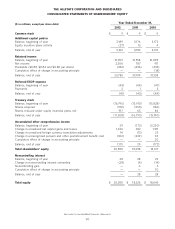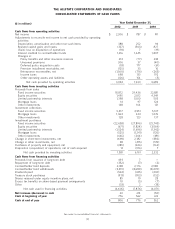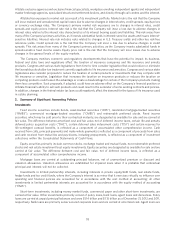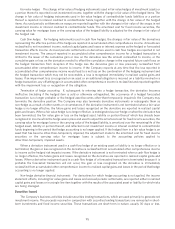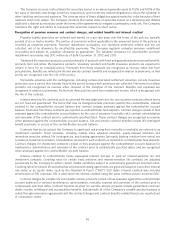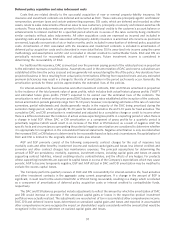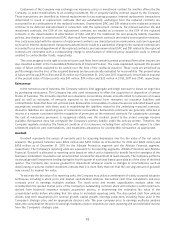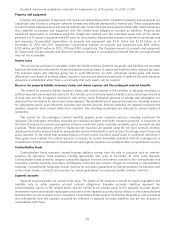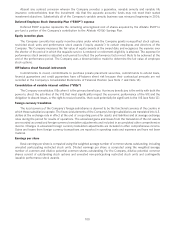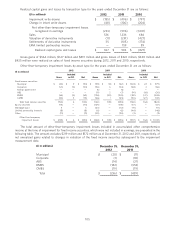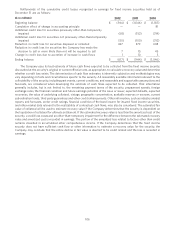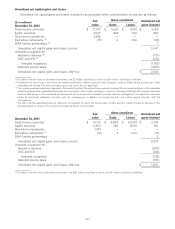Allstate 2013 Annual Report Download - page 215
Download and view the complete annual report
Please find page 215 of the 2013 Allstate annual report below. You can navigate through the pages in the report by either clicking on the pages listed below, or by using the keyword search tool below to find specific information within the annual report.Goodwill impairment evaluations indicated no impairment as of December 31, 2012 or 2011.
Property and equipment
Property and equipment is carried at cost less accumulated depreciation. Included in property and equipment are
capitalized costs related to computer software licenses and software developed for internal use. These costs generally
consist of certain external payroll and payroll related costs. Certain facilities and equipment held under capital leases are
also classified as property and equipment with the related lease obligations recorded as liabilities. Property and
equipment depreciation is calculated using the straight-line method over the estimated useful lives of the assets,
generally 3 to 10 years for equipment and 40 years for real property. Depreciation expense is reported in operating costs
and expenses. Accumulated depreciation on property and equipment was $2.41 billion and $2.29 billion as of
December 31, 2012 and 2011, respectively. Depreciation expense on property and equipment was $214 million,
$222 million and $239 million in 2012, 2011 and 2010, respectively. The Company reviews its property and equipment
for impairment at least annually and whenever events or changes in circumstances indicate that the carrying amount
may not be recoverable.
Income taxes
The income tax provision is calculated under the liability method. Deferred tax assets and liabilities are recorded
based on the difference between the financial statement and tax bases of assets and liabilities at the enacted tax rates.
The principal assets and liabilities giving rise to such differences are DAC, unrealized capital gains and losses,
differences in tax bases of invested assets, insurance reserves and unearned premiums. A deferred tax asset valuation
allowance is established when there is uncertainty that such assets will be realized.
Reserves for property-liability insurance claims and claims expense and life-contingent contract benefits
The reserve for property-liability insurance claims and claims expense is the estimate of amounts necessary to
settle all reported and unreported claims for the ultimate cost of insured property-liability losses, based upon the facts
of each case and the Company’s experience with similar cases. Estimated amounts of salvage and subrogation are
deducted from the reserve for claims and claims expense. The establishment of appropriate reserves, including reserves
for catastrophe losses, is an inherently uncertain and complex process. Reserve estimates are regularly reviewed and
updated, using the most current information available. Any resulting reestimates are reflected in current results of
operations.
The reserve for life-contingent contract benefits payable under insurance policies, including traditional life
insurance, life-contingent immediate annuities and voluntary accident and health insurance products, is computed on
the basis of long-term actuarial assumptions of future investment yields, mortality, morbidity, policy terminations and
expenses. These assumptions, which for traditional life insurance are applied using the net level premium method,
include provisions for adverse deviation and generally vary by characteristics such as type of coverage, year of issue and
policy duration. To the extent that unrealized gains on fixed income securities would result in a premium deficiency if
those gains were realized, the related increase in reserves for certain immediate annuities with life contingencies is
recorded net of tax as a reduction of unrealized net capital gains included in accumulated other comprehensive income.
Contractholder funds
Contractholder funds represent interest-bearing liabilities arising from the sale of products such as interest-
sensitive life insurance, fixed annuities, funding agreements and, prior to December 31, 2011, bank deposits.
Contractholder funds primarily comprise cumulative deposits received and interest credited to the contractholder less
cumulative contract benefits, surrenders, withdrawals, maturities and contract charges for mortality or administrative
expenses. Contractholder funds also include reserves for secondary guarantees on interest-sensitive life insurance and
certain fixed annuity contracts and reserves for certain guarantees on reinsured variable annuity contracts.
Separate accounts
Separate accounts assets are carried at fair value. The assets of the separate accounts are legally segregated and
available only to settle separate account contract obligations. Separate accounts liabilities represent the
contractholders’ claims to the related assets and are carried at an amount equal to the separate accounts assets.
Investment income and realized capital gains and losses of the separate accounts accrue directly to the contractholders
and therefore are not included in the Company’s Consolidated Statements of Operations. Deposits to and surrenders
and withdrawals from the separate accounts are reflected in separate accounts liabilities and are not included in
consolidated cash flows.
99



